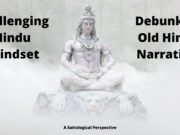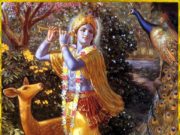Who is an ‘Atithi’?
A Brahmana who comes to your home without prior intimation.
The misquotation of the shloka from Tatittiriya Upanishad is responsible for weakening of Hindu identity. The Sanskrit word ‘atithi’ is very different from the English word ‘Guest’. In the English language the word guest means one who is invited.
There is no concept of uninvited guests in the western civilization. The uninvited guest in the western civilization is also an unwelcomed guest almost on par with a trespasser or one who is entering a private property without prior permission.
The western civilization was built on severe caste or class divisions between a peasant caste and the nobility caste which was often tied to economics and political power in the society. Most relationships in colonial era Europe were built on materialistic wealth and families. The concept of small nuclear families promoted by the church was meant to control the individual members. The guest in the western culture is welcomed with a prearranged food as per the pleasure of the host. The abrahamic civilization is well known to be highly individual minded. In abrahamic culture an uninvited guests are first considered as the aggressor and if the guest proclaims his/her faith to be the same as the host, then that guest is considered as a true friend. The concept of religion is paramount in establishing a particular type of welcome. If the uninvited guest doesn’t convert to their faith then that person is considered a threat. This is in sharp contrast to the faiths that have evolved from the core principles of Dharma that are followed by Hindus, Sikhs, Buddhists and also many other native cultures of the world.
Oftentimes most abrahamic cultures depend on conversion of natives to increase their numbers through strategic and sometimes deceitful propaganda.
Let’s analyze the three shloka of Taittiriya Upanishad in a relatable context to debunk the misconceptions. We cannot separate the wisdom of Upanishads from the purpose of Vedas as explained by Bhagavan Krishna in Bhagavad Gita.
शमो दमस्तप: शौचं क्षान्तिरार्जवमेव च ।
ज्ञानं विज्ञानमास्तिक्यं ब्रह्मकर्म स्वभावजम् ॥ ४२ ॥
This shloka from Bhagavad Gita explains the actions or karma by which teachers or brahmanas are defined.
The taittiriya Upanishad verses quoted below further explain the instructions to these teachers who are experts in Vedas. In that context the ‘atithi’ word is used to describe the uninvited brahmanas.
This word is not applicable to any other Varna. Because an uninvited guest in a warrior family or kings will be considered as an intruder. The word atithi cannot be applied to the Vaishya (mercantile) family because that will mean additional expenses for the host. Similarly, that particular word is also not applicable to shudra (skilled people such as artisans, doctors, engineers) or the middle class community because they cannot sometimes afford it. Therefore, that word is only applicable to Brahmana Varna because respect is the only currency in that community. Other communities of varnashrama have power, wealth and resources which brahmanas generally do not have.
वेदमनूच्याचार्योन्तेवासिनमनुशास्ति । सत्यं वद । धर्मं चर । स्वाध्यायान्मा प्रमदः । आचार्याय प्रियं धनमाहृत्य प्रजातन्तुं मा व्यवच्छेत्सीः । सत्यान्न प्रमदितव्यम्। धर्मान्न प्रमदितव्यम् । कुशलान्न प्रमदितव्यम् । भूत्यै न प्रमदितव्यम् । स्वाध्यायप्रवचनाभ्यां न प्रमदितव्यम् । देवपितृकार्याभ्यां न प्रमदितव्यम् ॥ १ ॥
मातृदेवो भव । पितृदेवो भव । आचार्यदेवो भव । अतिथिदेवो भव । यान्यनवद्यानि कर्माणि तानि सेवितव्यानि । नो इतराणि । यान्यस्माकँ सुचरितानि तानि त्वयोपास्यानि । नो इतराणि ॥ २ ॥
ये के चास्मच्छ्रेयाँसो ब्राह्मणाः तेषां त्वयाऽऽसनेन प्रश्वसितव्यम् । श्रद्धया देयम् । अश्रद्धयाऽदेयम् । श्रिया देयम् । ह्रिया देयम् । भिया देयम् । संविदा देयम् । अथ यदि ते कर्मविचिकित्सा वा वृत्तविचिकित्सा वा स्यात् ॥ ३ ॥
This particular second highly contextually misquoted verse from eleventh part of Taittiriya Upanishad teaching says – ‘Just like mother is divine, farther is divine, teacher of Vedic wisdom is divine, similarly, an uninvited Brahmana guest is also divine’ if that guest doesn’t come with the mindset of hurting the hosts.
If the intentions of such guests are hurtful towards the hosts then those guests need to be considered on par with enemies. This verse has been so much misused by various western as well as Hindu indologists that it has actually been misused by all invaders to India. British Christian colonizers were welcomed to India by those Indians who justified their actions by misusing this verse of Vedas. Similarly many Islamic looters to India were welcomed by weak Hindus who misused this Sanskrit verse to hide their deception towards the Hindu community. Such a narrative is still being peddled in Indian academic circles and also being misused to continue the abrahamic agendas of converting the Hindus.
Anyone with slight Sanskrit understanding can read one shloka before and one shloka afterwards can understand the context of this particular concept of ‘atithi’.
These teachings are given to brahmana or broad minded intelligent teachers who follow Vedic culture in their lives. The concept of atithi is for a person of similar background not anyone else. Because it is generally accepted in Vedic culture to invite people with spiritual or Vedic backgrounds. Spirituality is a topic of Vedas. No individual from abrahamic religious culture in the world can claim to be spiritual without being labeled as blasphemous. The scientific spiritual thought process is often considered as a threat to the dogmatic faiths.
Therefore, as per all Vedic evidences, we cannot misquote such shloka for everyone. It is specifically meant for educated teachers who follow Vedic wisdom. This teaching from Yagyavalka is for the followers of Brahminical culture through their actions not birth. Taittiriya upanishad are the words of Yagyavalka rishi.















